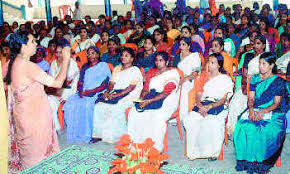
The campaign for this weekend’s European elections has seen the formation of lists that express a strong resistance to conservative, neoliberal and nationalistic attempts to control the European Parliament. Among these newly formed political entities is the Feminist Party for a Europe of Solidarity. This election is an opportunity for feminists to argue in the political realm. The public campaign system allows them to have their campaign clip filmed by professionals and mandates space for them in the media.
Each country in Europe will vote to elect their Members of the European Parliament (MEP). Then the MEPs regroup according to political visions and agreements to form groups. In the past Parliament several issues concerning women’s rights were downplayed.
The 2008 Parliamentary Assembly Resolution 1607 showed how the EU has delayed a clear positioning on women’s rights to control their own bodies. In December 2013, the European parliament failed to vote for the Estrela report that stated that reproductive rights are human rights. The reports spoke about the role of access to contraception and abortion especially for young women in the advancement of gender and economic equality in Europe. These lists demand the right to abortion to be inscribed in the European Charter, which, ideally, woud constrain the countries (Poland, Ireland and Malta) that have no such right to take action.
In France, Caroline de Haas, the top candidate for the Paris region, affirms that public policies are not neutral. In the rise of neoliberal debt economies, women are the most vulnerable to their policies. The austerity measures that have swept European countries recommend cuts on public services. Women are the most dependent on public services, which include reproductive services. Across Europe, women constitute an average of 70% of civil servants. When pay cuts and hiring freeze are the economic tools that governments adopt, the consequences for women and ultimately for society are dire. We have seen the devastation of these policies in Greece. In this destabilization of the civil society, violence against women has increased and the difficulties to report these crimes remain significant across Europe.
The Feminist Party program demands that the EU protect migrant women’s work conditions, whether for pay or not. Women are generally underpaid compared to their male counterparts, but when their immigration status is uncertain, the gap increases. The “ represent half of the migrants residing in Europe. Feminists in the Green party have also been critical of the immigration and refugee’s policies resulting in mistreatment of migrants.
The European feminist candidates, half of whom are men, assert that the feminist project is a political project in which both women and men must work together. That project is vast. The lists have been formed in Sweden with one candidate likely to have a seat, as well as Germany and France. In other countries, feminist political voices are heard in the Green Party, in other smaller progressive lists and in socialist coalitions. Feminists are realistic and clear: “Before changing the mentalities, which will take a long time, direct actions have to be taken. That is why feminism has to become a political matter.” The goal is to fight for new majorities and new solidarities and to fight the political apathy that the TINA (there is no alternative) doctrine has encouraged.
The fight is real, as nationalist parties have progressed all over Europe. Feminists know that gender does not guarantee feminism. Angela Merkel has fostered neoliberal policies with dire consequences for women’s rights and reproduction rights. Marine Le Pen the leader of the French nationalist party is promoting hatred and is ready to support the Spanish government’s breach on reproductive rights.
These lists have triggered positive reactions also among other progressive candidates who perceive the importance of building coalitions to force women’s rights and organize resistance to neoliberal infringement on public policies. Clearly, the threats of nationalistic and neoliberal demons are real. But as Paulo Freire stated, “Despair is unconvincing…and hope is reliable.” Let’s organize hope with a feminist voice!
(Image Credit: Féministes pour une Europe solidaire)

